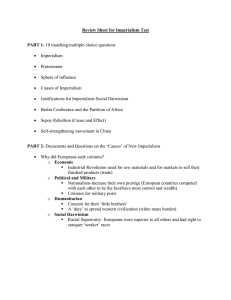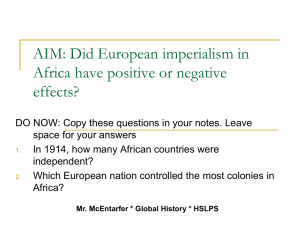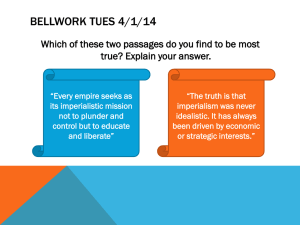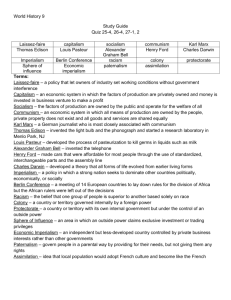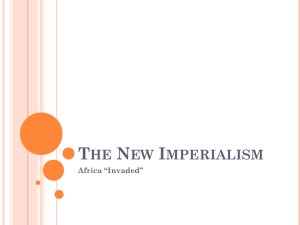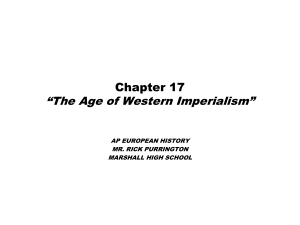World History & Geography Chapter 21
advertisement
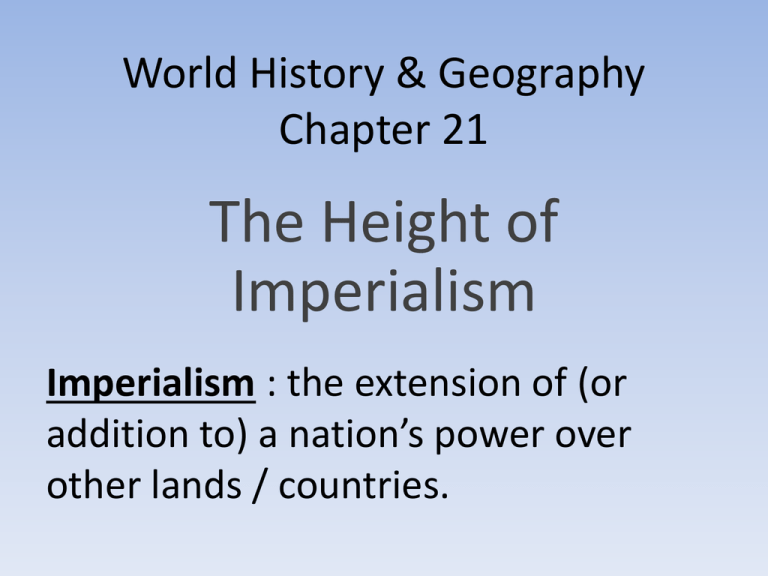
World History & Geography Chapter 21 The Height of Imperialism Imperialism : the extension of (or addition to) a nation’s power over other lands / countries. •Imperialism before the 1900’s often meant that the European countries were setting up trading posts in other countries. – After the 1900’s European countries often had direct control over vast areas of land their colonies. • One of the reasons that these European countries were taking control of these countries was for economic reasons. Chapter 21 - Section 1: Colonial Rule in Southeast Asia The BIG Idea: Through the new imperialism, Westerners controlled vast territories, exploited native populations, and opened markets for European products • The first and primary reason that Western (European) countries looked to control other countries was because of the economic motive. • Countries in Africa, Asia and Latin America had many natural resources. • Southeast Asia offered Coffee, Tea & Spices. • Africa had Peanuts, Hides & Palm Oil. • To send these natural resources back to the Imperial Country, plantations would be set up in the colonies, and native people would work for low wages. • The Imperial Powers did not want their colonies to develop enough wealth to start their own industries, so they also kept taxes very high on the colonies the controlled. • But in addition to shipping Natural Resources out of the countries they controlled, the European Colonial Powers sent finished products back to their colonies to sell, which made more profits for companies in Europe. • Brining out natural resources and shipping back finished products to sell gave Europeans a good trade balance Other motives for Imperialism •First was “Social Darwinism” which taught people that in the struggle between nations, the “fit” nations are those that are victorious over other countries. Social Darwinists believed that one country controlling another country was natural. • Social Darwinist Ideas were often pointed to by Racists who believed that particular races are superior. Other motives for Imperialism • Religious reasons also motivated Europeans to colonize other countries. The believed Europeans had a responsibility to bring civilization and religion to what they thought were “primitive” people. • This concept became known as the “White Man’s Burden” meaning that the white Europeans had a moral obligation to do these things for the less fortunate of the world. Ways of Governing Colonies • Colonies could be governed in two ways: • Under indirect rule local rulers were allowed to keep their status, but they were now taking orders from the imperial power. • Indirect rule was cheaper, because the imperial power did not have to send as many government officials. Ways of Governing Colonies • In countries were the local rulers were not open to becoming part of a European countries empire, the European needed to have direct rule over the colony, and European officials replaced the local leaders. • In Vietnam, the French used direct rule in the south, but used indirect rule to control northern Vietnam. Resistance to Colonial Rule • Many people who were being ruled by a Imperial Power were not happy with their situation. • At first, it was often the ruling class that was already there resisted being ruled from afar, but later the peasants and the middle classes became involved in resistance movements against the Imperial Powers. Positives & Negatives of Imperialism • Your text book describes many of the ways that Imperial control hurt the colony: • Natural resources were exploited, taxes were raised, wages were kept low, and the natural identity of the country was often lost. • Your book points to improved infrastructure, such as railroads, as a positive for the colony. Chapter 21 - Section 2: Empire Building in Africa The BIG Virtually all of Africa was under European Rule by 1900. Western & Northern Africa • The Colonization of Africa was a very short process. Great Britain annexed land on what became the Gold Coast and Nigeria in 1874. • France did not want its rival to be the only power in Africa, and by 1900 most of west Africa was under French control. • Germany also moved quickly to gain control Togo, Cameroon and other area further south in Africa. Egypt • Egypt had been part of the Ottoman Empire, but after the Ottoman power weakened, the Egyptians looked for their independence. • An officer of the Ottoman army name Muhammad Ali took power in 1805 and established Egypt as its own country. ( which one is he? ) Egypt • Under Ali, Egypt was brought into the modern world. Ali modernized the army, set up a public school system and helped created industries like sugar refining and ship building. • Now that Egypt was becoming an economic power, European countries like France and Great Britain began to notice what was going on in Egypt. Egypt • Many Europeans were also interested in Egypt because they wanted to build a canal east of Cairo to connect the Mediterranean Sea and the Red Sea. Egypt • French Businessmen built the Suez Canal between 1854 – 1869. • The British saw that Canal as a quick way to get to India, where they were also in control, so they bought Egypt’s share of the canal in 1875. • In 1881 an Egyptian army revolt against the British was put down and Great Britain was in complete control of Egypt by 1914. Central and East Africa • Central Africa was the next area of Africa that Europeans colonized. Explorers stirred up interest in the jungles of these areas. • David Livingstone was one of these explorers. He was sent to Africa as a medical missionary, but also so that he could find a river route into Central Africa to open the area up to European Business & Christianity. Central and East Africa • Livingstone became famous in Europe, and around the world as he continued to send back writings and maps of Africa. • Livingstone was so famous that when he disappeared, and American newspaper sent a young journalist named Henry Stanley to track him down. • When Stanley found Livingstone, his first words were: “Mr. Livingstone, I presume?” Central and East Africa South Africa • South Africa had actually been colonized by the Dutch since the late 1600’s. The Original White Dutch Settlers were known as the Boers (or Afrikaners) and were still there when the British took the area in the early 1800s. • At this point more and more British settlers were coming to what they called “Cape Colony” in South Africa. South Africa • In the 1830s the Boers, became upset with the British Rule, and moved away from the coast and further into the country and started their own republics. • The Boers believed that white superiority was ordained by God. The only jobs for non-Europeans in their society were for servants and laborers. South Africa • Eventually war broke out between the British and the Boers over the fact that some of the British wanted to take more of the Boer’s land. • The British won the Boer War in 1902, and created an independent Union of South Africa in 1910. As a way to keep the Boers happy, the British agreed that only the wealthiest Africans would be able to vote. Effects of Imperialism on Africa • By 1914, Great Britain, France, Germany, Belgium, Italy, Spain and Portugal had divided up Africa. • The only two free states left in Africa were Ethiopia and Liberia, which had been created as a homeland for the formerly enslaved persons of the United States. Effects of Imperialism on Africa • Most African colonies were ruled by Indirect Rule, as a way to save money. The British for example, let the existing political elites stay in power if they accepted orders and let the British make all the decisions. • This meant that the young and talented did not have any opportunities to be part of government. Effects of Imperialism on Africa • The policy of keeping the old African elite in power also meant that the British were playing favorites with which groups they wanted to be in power, and this lead to tensions between tribes, many of which are still being dealt with today in Africa, long after the Europeans have left.
